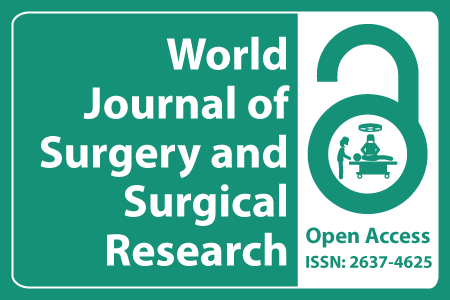
Journal Basic Info
- Impact Factor: 1.989**
- H-Index: 6
- ISSN: 2637-4625
- DOI: 10.25107/2637-4625
Major Scope
- Cardiovascular Surgery
- Gastroenterological Surgery
- Urological Surgery
- Podiatric Surgery
- Robotic Surgery
- Gynecological Surgery
- Surgical Oncology
- Laparoscopic Surgery
Abstract
Citation: World J Surg Surg Res. 2023;6(1):1514.DOI: 10.25107/2637-4625.1514
“Effect of Varicocele Surgery on Sperm Quality”
Chandrakant CT and Rajiv NS
Department of Surgery, North Delhi Municipal Corporation Medical College & Hindu Rao Hospital, India
*Correspondance to: Rajiv Nandan Sahai
PDF Full Text Research Article | Open Access
Abstract:
Introduction: A varicocele is a vascular lesion characterized by dilatation and tortuosity of the veins of pampiniform plexus. Varicocele is found in approximately 15% to 20% of adult male population and is the most common cause of treatable fertility. Physical examination may or may not show a palpable varicocele, most of the times varicoceles are diagnosed only when patients present with infertility or adolescents during a physical examination. Varicoceles are associated with various deleterious effects on testes like testicular hypotrophy, impairment in spermatogenesis mainly in form of low or absent count, decreased sperm motility and abnormal sperm morphology. Oxidative stress, scrotal hyperthermia, hormonal disturbances, testicular hypoperfusion, hypoxia and backflow of toxic metabolites are potential mediators of varicocele mediated infertility of which oxidative stress has been implicated as the central mediator of varicocele-associated infertility. Treatment for varicocele includes medical therapies, radiological embolization, and surgical techniques. Medical therapy, including antioxidants and anti-inflammatory agents have been utilized to treat symptomatic men with varicocele and infertility in men with varicocele with variable success. A definitive conclusion of indication of medical treatment cannot be drawn at the present time because most published studies have inadequate design and lack controls. Radiological embolization of varicocele is newer technique in treatment of varicocele, but it is associated with high recurrences and high cost. Varicoceles are surgically treated either by open or laparoscopic approaches. The principle aim of the surgery is the occlusion of the dilated veins of the pampiniform plexus. Various studies in the past have concluded significant change in sperm parameters (total count, motility, morphology) post varicocele repair. Natural pregnancy rates after varicocelectomy when female factors are excluded, are approximately 44.1% at 1 year follow-up. However, few other studies suggest no improvement in sperm parameters following surgical varicocele repair and studies that conclude recommendations against repair of varicocele. Thus, conflicting opinion have opened scope to establish this fact by this study. Aim: To evaluate changes in sperm morphology, sperm count, sperm motility in a patient with varicocele after varicocele surgery. Materials and Method: Study conducted in the Department of Surgery, North Delhi Municipal Corporation Medical College & Hindu Rao Hospital, Delhi, India from August 2019 to February 2021. Sample size was calculated to be 50 using Slovin’s formula with a confidence level of 95% with margin error taken as 5% (p value 0.05). Sperm morphology, sperm count, sperm motility were the parameters studied before and after 3 months of surgery. Results: Majority of patients belonged to age group of 18 to 25 years (42%) followed by 26 to 35 years (40%) (27.78 ± 6.547 years.) Left sided varicocele was more common (54%), followed by bilateral varicocele (42%) Varicocele grade II was most common (58%) followed by grade I (30%) and lastly grade III (12%). Total sperm count improved by 8.88 million per ml after varicocelectomy. Total sperm motility improved by 6.08% after the surgery. Total normal sperm forms improved by 6.44% after varicocele repair. Conclusion: Based on above findings it was conclude that Varicocelectomy results in significant improvement in total sperm count, total sperm motility and total normal sperm morphology. Best improvement was seen in sperm count followed by total normal sperm forms and lastly total sperm motility.
Keywords:
Varicocele; Infertility; Sperm quality; Surgery
Cite the Article:
Chandrakant CT, Rajiv NS. “Effect of Varicocele Surgery on Sperm Quality”. World J Surg Surgical Res. 2023; 6: 1514..













